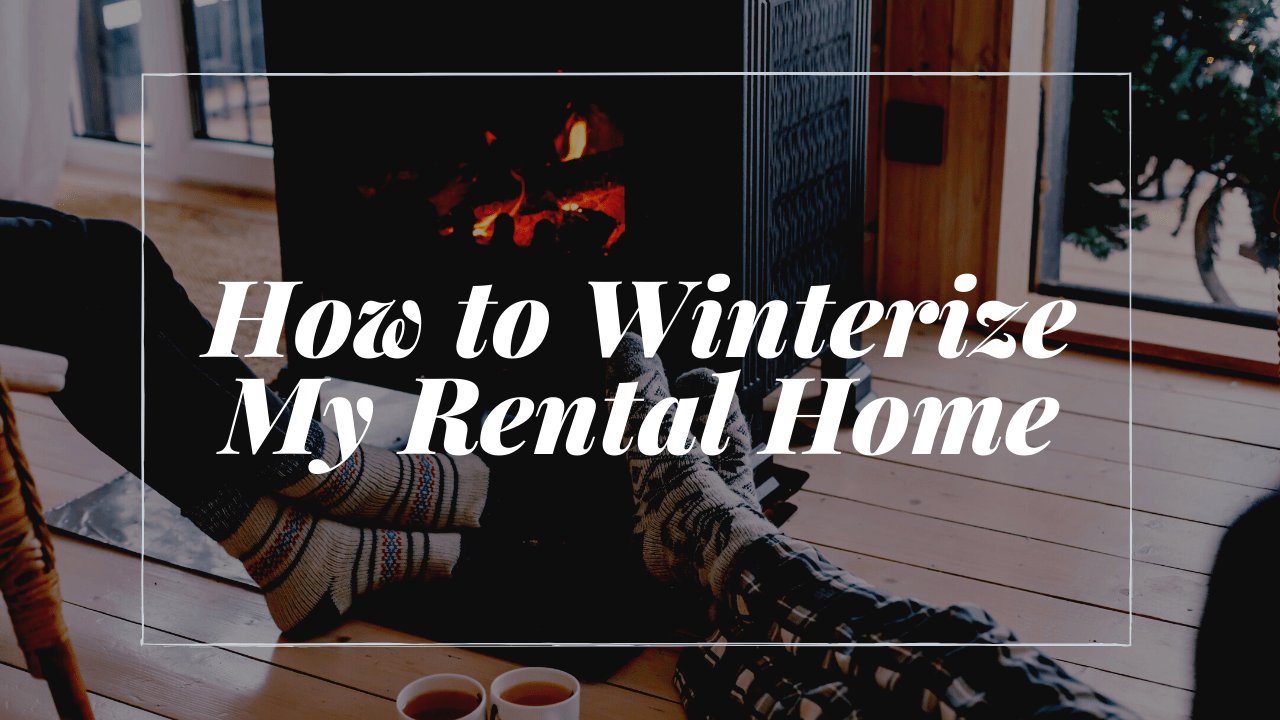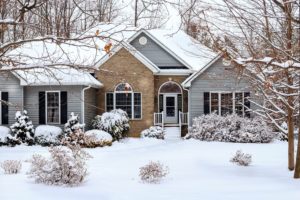
Winter looks different in each part of the country, and in Michigan you can expect cold, ice and snow. There are things you need to do to winterize your rental home, especially if it’s vacant.
Water
First, call the city and have them turn the water off at the street. Many times, people will only turn off the water at the meter. That may get you through some cold weather, but if it’s going to be a hard winter, it is much safer to have it turned off at the street. So a good Grand Rapids property manager will recommend you cut the water off at the street. Then, drain the pipes.
Open the water heater and let all the water drain. Once the tank is dry, get some antifreeze. You’re looking for the type of antifreeze you’d use on a motor home. Put the antifreeze down each trap so the trap fills up with antifreeze.
The toilets should be flushed one last time, and then you’ll put antifreeze into the tank. Some people handle toilets differently and they put a whole gallon of antifreeze down the toilet. You might want to put it in the tank, and then flush the toilet again so the antifreeze mixes with the water in the bowl and the trap.
If the home is going to be empty for a long period of time, put plugs in the drains otherwise the antifreeze may evaporate. Without a cap, you’ll get an unpleasant sewer smell in the house. With the plugs, the trap won’t dry out as fast and when it does, you still won’t have that awful smell.
Windows and Doors
Lock every window properly and put deadbolts on every door. Check the service doors in the garage as well. Those doors need deadbolts as well so it’s not easy to get into the house.
Lights
There’s some debate about whether to leave the lights on. Some property owners choose to leave lights on with a timer. Remember that the lights may not mean much. In the winter, when the driveway isn’t plowed and the snow is piling up, people are going to know no one is home.
Heating
You can turn the heat off in the property, but we don’t recommend it. The water has been drained from your pipes in case the heat does go out, but if you leave the heat off in the house and the temperature drops to 20 or 30 degrees, the plaster and drywall can shrink and crack. Many property managers will recommend you keep the heat on for that reason.
Sump Pump
 If you have a sump pump and a finished basement, consider a backup battery and/or an alarm. The alarm bolts right to the pipe, and if the flow gets too high, you’ll get an alert. You can set it up to receive a text message when this happens.
If you have a sump pump and a finished basement, consider a backup battery and/or an alarm. The alarm bolts right to the pipe, and if the flow gets too high, you’ll get an alert. You can set it up to receive a text message when this happens.
If you have any questions or you need any help, contact us at United Properties for assistance in winterizing your home.
 Sergio joined United Properties in 2020. He is a graduate from Pickens Technical College as a Nurse Assistant and as a Small Animal Care Provider in 2010. In the past nine years, Sergio has had various jobs, all focused around customer service.
Sergio joined United Properties in 2020. He is a graduate from Pickens Technical College as a Nurse Assistant and as a Small Animal Care Provider in 2010. In the past nine years, Sergio has had various jobs, all focused around customer service. Eden joined United Properties in 2016. Eden graduated from Davenport University in 2015 with an Associate’s in Business Administration. She’s the Executive Assistant to the Owner of United Properties, with a focus on procedural documentation. She enjoys playing guitar, reading, and doing outdoor activities. Eden is trilingual and able to communicate in English, Spanish, and American Sign Language.
Eden joined United Properties in 2016. Eden graduated from Davenport University in 2015 with an Associate’s in Business Administration. She’s the Executive Assistant to the Owner of United Properties, with a focus on procedural documentation. She enjoys playing guitar, reading, and doing outdoor activities. Eden is trilingual and able to communicate in English, Spanish, and American Sign Language.  David joined the United Properties team in 2019 as the Director of Client Relations and Business Development. In this capacity, he is responsible for leading all leasing, application underwriting, tenant relations, accounts receivable, process improvement, remote workers, and general office functionality (essentially anything outside of maintenance and service). David comes from a longstanding career at a Fortune 15 company primarily in a sales and customer service leadership role.
David joined the United Properties team in 2019 as the Director of Client Relations and Business Development. In this capacity, he is responsible for leading all leasing, application underwriting, tenant relations, accounts receivable, process improvement, remote workers, and general office functionality (essentially anything outside of maintenance and service). David comes from a longstanding career at a Fortune 15 company primarily in a sales and customer service leadership role.

 Matthew joined the United Properties in early 2020. He is a graduate of Lee University with a bachelor’s in Intercultural Studies and also a master’s in Discipleship and Christian Formation. Matthew serves as a project manager over the Rent Ready process. He has 20 years of construction experience and over 10 years of experience in leadership positions. He oversees a team of technicians and schedules outside vendors getting properties back to the United rent-ready standard so that they can be leased again.
Matthew joined the United Properties in early 2020. He is a graduate of Lee University with a bachelor’s in Intercultural Studies and also a master’s in Discipleship and Christian Formation. Matthew serves as a project manager over the Rent Ready process. He has 20 years of construction experience and over 10 years of experience in leadership positions. He oversees a team of technicians and schedules outside vendors getting properties back to the United rent-ready standard so that they can be leased again.

 Carla joined United Properties in late 2019 as a billing specialist. Carla ensures invoices are received from contractors and bills them out in a timely fashion.
Carla joined United Properties in late 2019 as a billing specialist. Carla ensures invoices are received from contractors and bills them out in a timely fashion. Cristina joined United Properties as the Accounting and Billing Team Lead in October of 2020. She has experience as a technology professional, an English-Spanish translator, and has worked the past several years as the treasurer of her condominium.
Cristina joined United Properties as the Accounting and Billing Team Lead in October of 2020. She has experience as a technology professional, an English-Spanish translator, and has worked the past several years as the treasurer of her condominium. Rick joined United Properties in 2020 as a Service Coordinator and then later transitioned to the Collections team, where his customer service shines. Rick has an extensive background in customer service and enjoys being able to resolve issues. He and his wife are raising their two kids and in his free time, Rick enjoys making his own homemade jerky.
Rick joined United Properties in 2020 as a Service Coordinator and then later transitioned to the Collections team, where his customer service shines. Rick has an extensive background in customer service and enjoys being able to resolve issues. He and his wife are raising their two kids and in his free time, Rick enjoys making his own homemade jerky. Harriet joined United Properties as a Accounting & Billing Specialist in February of 2021. She has experience as a bookkeeper and a Property Manager for a Real Estate account. She was a working student during her college days. Harriet loves cleaning because she thinks it is therapeutic. She also loves watching series during her free time, and she’s a fur mom of one dog. Her inspiration to work every day is her family.
Harriet joined United Properties as a Accounting & Billing Specialist in February of 2021. She has experience as a bookkeeper and a Property Manager for a Real Estate account. She was a working student during her college days. Harriet loves cleaning because she thinks it is therapeutic. She also loves watching series during her free time, and she’s a fur mom of one dog. Her inspiration to work every day is her family. Diego has an extensive background in customer service and, most recently in Maintenance and
Diego has an extensive background in customer service and, most recently in Maintenance and Paulina joined United in early 2021 as a Leasing Assistant. She has a background studying social work, with several years of experience in customer service. She speaks English and Spanish fluently and loves to learn. Paulina enjoys small road trips and cold, rainy weather. Her dog is her favorite thing in the world.
Paulina joined United in early 2021 as a Leasing Assistant. She has a background studying social work, with several years of experience in customer service. She speaks English and Spanish fluently and loves to learn. Paulina enjoys small road trips and cold, rainy weather. Her dog is her favorite thing in the world.
 Jessica has a Bachelor’s Degree in Financial strategies and public accounting and is studying a masters in Blockchain and Fintech regulation. She has previous experience as a customer service representative. She speaks English and Spanish. She loves taking long walks with her three dogs, hiking and road tripping during the weekends.
Jessica has a Bachelor’s Degree in Financial strategies and public accounting and is studying a masters in Blockchain and Fintech regulation. She has previous experience as a customer service representative. She speaks English and Spanish. She loves taking long walks with her three dogs, hiking and road tripping during the weekends.
 Chris Good is new to the United Properties Team since June 2022 as a Business Development Manager. With years of experience in both the construction industry (Master Electrician) and the Real Estate industry (Broker), he will closely work with new and experienced investors to facilitate their real estate goals.
Chris Good is new to the United Properties Team since June 2022 as a Business Development Manager. With years of experience in both the construction industry (Master Electrician) and the Real Estate industry (Broker), he will closely work with new and experienced investors to facilitate their real estate goals.


 Melba Alvarez
Melba Alvarez Enrique Vergara (Henry)
Enrique Vergara (Henry) Alyssa Conklin
Alyssa Conklin




 Leo Lacson
Leo Lacson